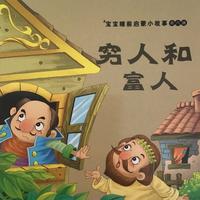穷人 和 宜人
бедные||приятный
||riche
poor person|and|pleasant
pobre|e|agradável
der Arme||angenehm
가난한 사람|와|적합한 사람
||agradable
arm und angenehm
Pobre y deseable
Pauvre et souhaitable
Poveri e desiderabili
貧しくて楽しい
불쌍하고 바람직한
Slecht en wenselijk
pobre e agradável
Плохое и желаемое
Dålig och önskvärd
The poor and the pleasant.
上帝 来到 人间 ,决定 找 户 人家 借宿 。
God|came to|the world|decided|to find|household|family|to stay overnight
Gott kam auf die Welt und beschloss, eine Familie zu finden, um dort zu übernachten.
神はこの世に来られ、眠る家族を見つけることを決心しました。
하나님은 이 땅에 오셔서 함께 지낼 가족을 찾기로 결정하셨습니다.
Deus veio ao mundo e decidiu encontrar uma família para passar a noite.
God came to the world and decided to find a family to stay with.
一个 富人 见 上帝 衣着 朴素 ,不 像 有钱人 ,就 找 理由 拒绝 了 。
one|rich man|saw|God|clothing|simple|not|like|wealthy person|then|find|reason|refused|past tense marker
Als ein reicher Mann sah, dass Gott im Gegensatz zu einem reichen Mann in Zivil gekleidet war, fand er Gründe, dies abzulehnen.
金持ちは、金持ちとは異なり、神が私服を着ているのを見ると、断る理由を見つけます。
그리고 한 부자는 하나님이 소박한 옷을 입고 부자처럼 보이지 않는 것을보고 그를 거절 할 이유를 찾았습니다.
Um rico viu Deus vestido de maneira simples, não como os milionários, então encontrou uma razão para recusar.
A rich man saw God dressed simply, not like a wealthy person, and found a reason to refuse.
上帝 来到 穷人家 ,受到 了 热情 招待 。
||бедная семья||||
||maison de pauvres||||
God|came to|poor people's home|received|past tense marker|warm|hospitality
|||||recepção|
||Arme Leute||||
|왔다|가난한 집|받다||열정적인 환대|환대
||la casa de los pobres||||hospitalidad
Gott kam zum Armenhaus und wurde herzlich bewirtet.
神は貧しい家に来られ、温かく迎えられました。
Deus foi à casa de um pobre e recebeu uma calorosa recepção.
God came to the poor family's house and was warmly welcomed.
上帝 决定 满足 他们 三个 愿望 。
||удовлетворить|||
||erfüllen|sie||
God|decided|fulfill|their|three|wishes
||||três|desejos
||||tres|
Gott beschloss, ihre drei Wünsche zu erfüllen.
神は彼らの3つの願いを叶えることにしました。
신은 세 가지 소원을 들어주기로 결정했습니다.
Deus decidiu atender aos três desejos deles.
God decided to fulfill their three wishes.
富人 知道 后 ,忙 骑马 追赶 上帝 ,借着 忏悔 也 想 提出 三个 愿望 。
rich man|know|after|hurriedly|ride a horse|chase|God|by|repentance|also|want|make|three|wishes
Nachdem die Reichen davon erfuhren, eilten sie zu Pferd, um Gott zu jagen und wollten aus Reue auch drei Wünsche äußern.
金持ちはそれを知った後、急いで馬に乗って神様を追いかけ、悔い改めながら三つの願い事をしたいと思いました。
Depois que o homem rico descobriu, ele correu atrás de Deus a cavalo e quis fazer três desejos por meio do arrependimento.
The rich man, knowing this, hurried to ride his horse to catch up with God, hoping to make three wishes through repentance.
可 马 不 听 使唤 ,他 说 了 些 气话 ,马 竞 倒地 身亡 了 。
but|horse|not|listen|command|he|said|past tense marker|some|angry words|horse|unexpectedly|fall to the ground|die|past tense marker
Aber Ma hörte nicht zu, er sagte etwas Wütendes, und Ma Jing fiel zu Boden und starb.
しかし、マは従わなかった、彼はいくつかの怒った言葉を言った、そしてアトレティコは地面に倒れて死んだ。
Mas o cavalo não ouviu, disse algumas palavras raivosas, e o Atlético caiu no chão e morreu.
But the horse would not listen to his commands; in a fit of anger, he said some harsh words, and the horse fell to the ground and died.
他 让 妻子 坐 在 马鞍 上 ,妻子 竟然 下 不来 了 。
he|let|wife|sit|on|saddle|on|wife|unexpectedly|get down|unable to come down|emphasis marker
Er ließ seine Frau im Sattel sitzen, aber sie konnte nicht absteigen.
彼は妻をサドルに座らせたが、彼女は降りることができなかった。
Ele colocou a esposa na sela, mas ela não conseguiu descer.
He let his wife sit in the saddle, and she couldn't get down.
富人 垂头丧气 ,不仅 什么 都 没 得到 ,反而 失去 了 一匹马 。
rich person|dejected|not only|anything|at all|not|gain|on the contrary|lose|past tense marker|one horse
Der reiche Mann war niedergeschlagen, und anstatt nichts zu bekommen, verlor er ein Pferd.
金持ちはがっかりしました。何も手に入れられなかっただけでなく、馬を失いました。
O homem rico ficou abatido, não só não ganhou nada, mas perdeu um cavalo.
The rich man was dejected; not only did he get nothing, but he also lost a horse.
SENT_CWT:AsVK4RNK=125.62 PAR_TRANS:gpt-4o-mini=1.84
en:AsVK4RNK
openai.2025-01-22
ai_request(all=11 err=0.00%) translation(all=9 err=0.00%) cwt(all=90 err=0.00%)

